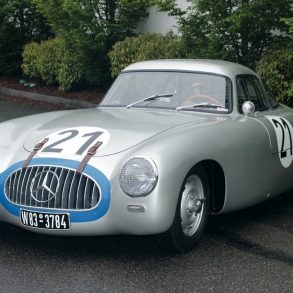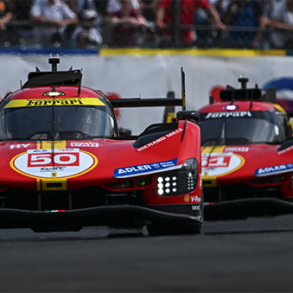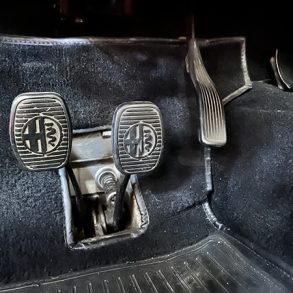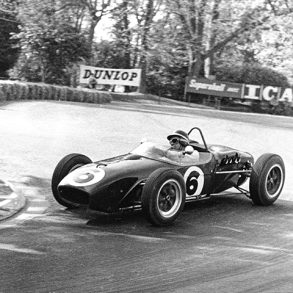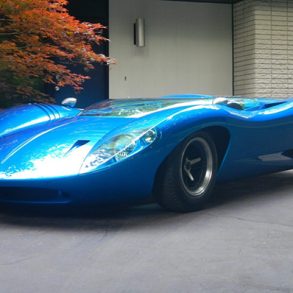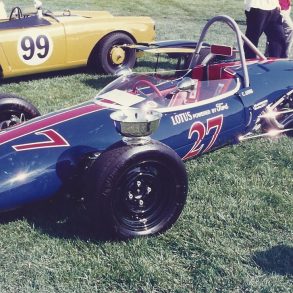Think for a moment what makes a driver great – a true champion. Go ahead, I’ll wait…hmmmh, hmmh, hmmmh. Done? What came to mind? Skill? Absolutely. Without doubt the true greats possess an inherent, seemingly hard-wired, ability to know and feel what a car is doing. This has been evidenced throughout the years by drivers like Clark and Fangio who could slip behind the wheel of a car they had never set eyes on before and within a couple of laps push the car faster than drivers with far more experience. Perhaps it’s genetics.
What else defines the greats? Nerve? Certainly this has to be a key component as well. How else could you get behind the wheel of a car that you had never driven before and push it faster than it has ever gone? Drivers like Villeneuve and Senna were capable of feats of shear courage behind the wheel that made other top-line drivers cringe just to think of it.
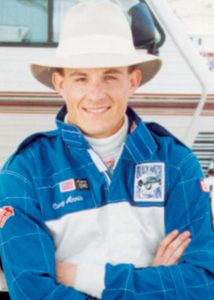
But there is one more ingredient that is not only essential, but in this day and age, seemingly in short supply. Many drivers have won races and championships without it, however they will never be considered in the same breath with the “Great Ones” that possess it. This final elusive element is character. I submit to you that in addition to naked skill and raw courage, a champion is not a champion without character. If you stop again for a moment and consider which F1 “Great Ones” took their laurels while maintaining a high degree of integrity and character, the list becomes remarkably shorter. Drivers like Fangio, McLaren, Gurney and Clark were all noted for not only being great drivers, but for being great human beings as well. However, this list would be shamefully incomplete were it not to include Sir Stirling Moss somewhere near the top.
Moss was not only one of the greatest drivers of the late ’40s, ’50s and early ’60s, but he was also one of the most respected. As Juan Manuel Fangio once noted to Moss, “…your outstanding qualities, made you one of the finest drivers of your time. You never won the Championship, but it is not without reason that they call you ‘The Champion without a Crown.’” In Formula One alone, Moss racked up 16 victories in only 66 starts. He came close to the championship on several occasions but none closer than in 1958. The championship was to be decided at the last race of the season, the Moroccan Grand Prix. Moss (who had won four Grands Prix that season) needed both a win and fastest lap to take the championship, while Mike Hawthorn (who won only one Grand Prix that season) had to finish at least second. Moss dug down deep and came up with a stunning drive in his Vanwall, not only winning the race, but also taking the necessary extra point for fastest lap. However, in the closing laps, Phil Hill moved over and let teammate Hawthorn through to collect second place and snatch the championship away. Unlike the Schumachers of today, Moss didn’t throw a tantrum or protest the team tactics, he stood on the victory podium and congratulated Hawthorn on a job well done. In his book “Stirling Moss: My Cars, My Career,” Moss commented that he thought Hawthorn deserved to win the championship and that his congratulations that day on the rostrum were truly genuine. Obviously a “Champion” with not only skill, nerve and character, but class as well.
The fact that Moss is universally considered one of motor racing’s “Great Ones” makes it all the more an honor that, starting with this issue, he joins the Vintage Racecar Journal as a monthly columnist. The thing that I think is particularly exciting about Moss’ upcoming contributions to the magazine is that in addition to our thoroughly researched features and profiles, we will now also enjoy first-hand accounts of events and personalities from one of the most intriguing periods in motorsport history. In part, due to the fact that Moss has always been a dedicated keeper of a personal journal throughout his career, the stories and viewpoints that you will read in Moss’ columns will be as fresh and insightful as a postrace interview conducted in the ’50s. And if that’s not reliving motor racing history, I don’t know what is.




